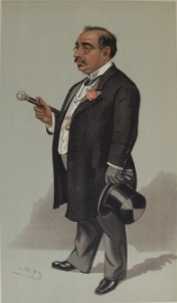Mancherjee Bhownagree

Sir Mancherjee Merwanjee Bhownagree, KCIE (15 August 1851 – 14 November 1933) was a British Conservative Party politician of Indian Parsi heritage. He was a Member of Parliament (MP) representing the constituency of Bethnal Green North East in the Parliament of the United Kingdom between 1895 and 1906, the second Indian to be a British MP after fellow Parsi Dadabhai Naoroji, and the longest-serving British Asian MP until Keith Vaz (first elected in 1987).
Biography
Bhownagree was born the son of a merchant in Bombay (now Mumbai), India, and was educated in Elphinstone College and the University of Bombay. He became a journalist after finishing his education. At 22, he was appointed, on the death of his father, to succeed to the Bombay agency of the Kathiawar state of Bhavanagar. Bhownagree went to Great Britain in 1882. Called to the bar at Lincoln's Inn in 1885, in the following year the Maharaja appointed him judicial councillor, a post in which he introduced far-reaching reforms.[1]
Bhownagree settled in the United Kingdom in 1891[1] becoming a lawyer. He was the head of the Parsi organization in Europe and chairman of the Indian Social Club. He joined the Conservative Party and was selected as the party's candidate in the 1895 general election for N.E. Bethnal Green. His compatriot Dadabhai Naoroji was in the 1892-5 parliament, but Bhownaggree was the only other Indian of that time to enter the House of Commons, and the only one to be re-elected (1900). He was made a Companion of the Most Eminent Order of the Indian Empire (CIE) in 1886, and was knighted as a Knight Commander of the Most Eminent Order of the Indian Empire (KCIE) upon the occasion of Queen Victoria's Diamond Jubilee in 1897.
During his ten years in parliament, Bhownagree was a supporter of British rule in India and opposed the campaign for home rule.[2] He originated and unflaggingly maintained in and out of the House the long battle against the disabilities of Indians in South Africa and other overseas dominions of the Crown. His cogent and detailed statement of the case for Indians in the Transvaal after annexation was the basis of a blue-book (Cd. 2239, 1904), and was sent to Lord Milner by the Colonial Secretary, Alfred Lyttelton, with the observation that he felt much sympathy for the views expressed, and that it would be difficult to give a fully satisfactory answer. The practical result was that the proposals of the High Commissioner were in some important particulars rejected. Bhownaggree was one of the first Indians to press forward the need for technical and vocational education in India side by side with literary instruction.[1]
After losing his seat in the 1906 general election he retired from politics. He was a generous donor contributing to many charities in the memory of his deceased sister. He also contributed the Bhownagree Gallery in the Commonwealth Institute.
He died on 14 November 1933 in London.[3]
Writings
In early life, he wrote a history of the constitution of the East India Company, and made a Gujarati translation of Queen Victoria's Life in the Highlands. During World War I, he assisted in repelling German propaganda regarding British rule in India by means of a widely circulated booklet entitled The Verdict of India.[1]
See also
| Wikisource has original works written by or about: Mancherjee Merwanjee Bhownagree |
| Wikimedia Commons has media related to Mancherjee Bhownagree. |
References
- ↑ 1.0 1.1 1.2 1.3
 Chisholm, Hugh, ed. (1922). "Bhownaggree, Sir Mancherjee Merwanjee". Encyclopædia Britannica (12th ed.). London & New York.
Chisholm, Hugh, ed. (1922). "Bhownaggree, Sir Mancherjee Merwanjee". Encyclopædia Britannica (12th ed.). London & New York. - ↑ Migration histories: Politics at www.movinghere.org.uk
- ↑ http://www.open.ac.uk/researchprojects/makingbritain/content/mancherjee-merwanjee-bhownaggree
External links
- Hansard 1803–2005: contributions in Parliament by Sir Mancherjee Bhownagree
- Asians in British politics
- Profile
| Parliament of the United Kingdom | ||
|---|---|---|
| Preceded by George Howell |
Member of Parliament for Bethnal Green North East 1895–1906 |
Succeeded by Edwin Andrew Cornwall |